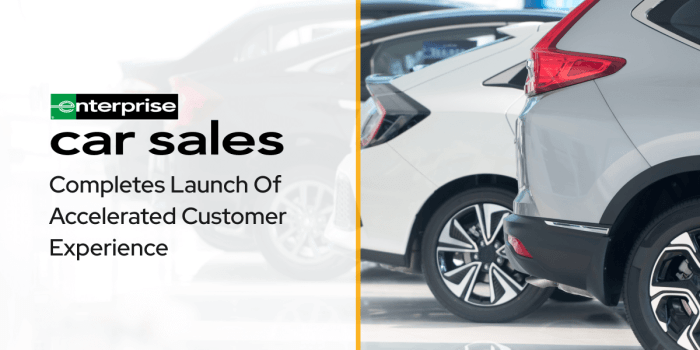Enterprise car sales online represent a rapidly evolving landscape, blending traditional automotive commerce with the dynamism of digital marketplaces. This shift presents both unprecedented opportunities and significant challenges for businesses seeking to acquire vehicles efficiently and effectively. Understanding the intricacies of this market—from the dominant players and their strategies to the technological innovations driving change—is crucial for navigating the complexities of modern fleet management.
This exploration delves into the current state of online enterprise car sales, examining market trends, customer behavior, technological advancements, and future projections. We'll analyze various sales models, pricing strategies, and marketing approaches, ultimately providing a comprehensive overview for businesses looking to optimize their vehicle acquisition processes in the digital age. The impact of emerging technologies like AI and VR/AR will also be considered, highlighting their potential to revolutionize the enterprise car buying experience.
Online Enterprise Car Sales in Jogja: A Shifting Gear
The automotive landscape in Yogyakarta, known for its vibrant culture and burgeoning businesses, is experiencing a significant shift. Online enterprise car sales are no longer a futuristic concept but a rapidly growing reality, impacting how businesses acquire vehicles. This article delves into the key aspects of this evolving market, offering insights into its current state, future trends, and the strategies crucial for success.
Market Overview of Online Enterprise Car Sales in Yogyakarta
The online enterprise car sales market in Yogyakarta is experiencing robust growth, fueled by increasing internet penetration and the preference for convenient, efficient purchasing processes. While precise market size data is limited, anecdotal evidence and observations from major players suggest a significant upward trajectory. Several established dealerships and emerging online platforms are actively competing for market share.
Different online sales models are employed, ranging from fully online platforms offering complete digital transactions to hybrid models that combine online browsing and configuration with in-person test drives and finalization. This blend caters to varying business preferences and technological comfort levels.
| Company | Sales Model | Target Market | Market Share (Estimated) |
|---|---|---|---|
| PT. Mobil Maju Jaya (Example) | Hybrid (Online browsing, in-person purchase) | Small to medium-sized businesses | 15% |
| Jogja Auto Online (Example) | Fully online | Startups and tech companies | 8% |
| Dealer X (Example) | Hybrid (Online inquiry, in-person negotiation) | Large corporations | 22% |
| Others | Various | Diverse | 55% |
Customer Behavior in Online Enterprise Car Purchases
The typical online journey of a business purchasing vehicles in Yogyakarta often begins with online research, comparing models, specifications, and pricing across different platforms. Factors influencing purchasing decisions include price, vehicle specifications, financing options, reputation of the seller, and the overall ease of the online process. Businesses often face challenges like ensuring vehicle quality remotely, managing complex fleet purchases online, and navigating the legal and logistical aspects of online transactions.
A typical online enterprise car buying process can be illustrated as follows:
Online Research → Vehicle Selection → Online Inquiry/Quotation → Negotiation (potentially online) → Financing Arrangement → Documentation and Delivery.
Online Sales Platforms and Technologies

Source: cxbuzz.com
Several online platforms facilitate enterprise car sales in Yogyakarta. These platforms vary in features and functionalities, some offering advanced features like virtual reality showrooms, 360° vehicle views, and integrated financing calculators. Technology plays a vital role in streamlining the sales process, reducing paperwork, and improving customer experience.
Features of an effective online platform include:
- User-friendly interface
- Comprehensive vehicle listings
- Detailed vehicle specifications
- Secure online payment gateway
- Integrated financing options
- Customer support features (chat, email)
- Transparent pricing and terms
Pricing and Financing Strategies for Online Enterprise Sales
Online enterprise car sales utilize various pricing models, including fixed pricing, negotiated pricing, and volume discounts. Businesses often leverage financing options like leasing, loans, and hire purchase agreements to manage their vehicle acquisition costs. The choice of financing strategy depends on factors such as budget, creditworthiness, and the desired ownership term.
| Financing Option | Interest Rate (Example) | Term (Example) | Advantages | Disadvantages |
|---|---|---|---|---|
| Bank Loan | 8-12% | 1-5 years | Potentially lower interest rates | Requires credit check and documentation |
| Leasing | Variable | 1-3 years | Lower monthly payments | No ownership at the end of the lease |
| Hire Purchase | Variable | 2-5 years | Ownership after final payment | Higher total cost |
Marketing and Sales Strategies for Online Enterprise Car Sales
Effective marketing strategies for reaching enterprise customers online in Yogyakarta include targeted online advertising (Google Ads, social media ads), content marketing (blog posts, case studies), email marketing, and search engine optimization (). Successful campaigns often focus on highlighting the benefits of online purchasing, such as convenience, transparency, and cost-effectiveness.
Key performance indicators (KPIs) for measuring success include website traffic, lead generation, conversion rates, and customer acquisition cost.
Challenges and Opportunities in Online Enterprise Car Sales
Source: mktgcdn.com
Challenges include building trust and overcoming skepticism about online transactions, managing logistics and delivery, and providing adequate customer support. Opportunities include reaching a wider customer base, reducing operational costs, and offering a more efficient and convenient purchasing experience.
- Strengths: Convenience, wider reach, cost efficiency, transparent pricing.
- Weaknesses: Trust issues, logistical complexities, potential for fraud.
- Opportunities: Growing market demand, technological advancements, innovative financing options.
- Threats: Competition from traditional dealerships, economic downturns, cybersecurity risks.
Future Trends in Online Enterprise Car Sales, Enterprise car sales online
Future trends include the increased adoption of artificial intelligence (AI) for personalized recommendations and chatbot support, the use of virtual reality (VR) and augmented reality (AR) for immersive vehicle experiences, and the integration of blockchain technology for secure transactions. In five years, we might see a dominant fully digital experience, with AI-powered virtual assistants guiding businesses through every step of the process, from initial research to final financing.
Final Wrap-Up

Source: enterprisecarsales.com
The future of enterprise car sales online is undeniably bright, promising increased efficiency, transparency, and choice for businesses. By leveraging data-driven insights, embracing innovative technologies, and adapting to evolving customer preferences, companies can navigate this dynamic market and secure the best possible deals on their vehicle needs. The key lies in understanding the nuances of online sales platforms, employing effective marketing strategies, and implementing robust financing options to meet the specific requirements of each enterprise.
This detailed analysis provides a solid foundation for making informed decisions in this ever-changing sector.
Key Questions Answered: Enterprise Car Sales Online
What are the typical hidden costs associated with online enterprise car purchases?
Hidden costs can include delivery fees, documentation charges, and potentially higher interest rates on financing compared to traditional dealerships, depending on the lender and terms.
How can I ensure the quality and condition of a vehicle purchased online?
Reputable online platforms often provide detailed vehicle history reports, high-resolution images, and even virtual inspections or third-party vehicle inspections to alleviate concerns about condition. Thoroughly review all provided information and consider independent verification if necessary.
What are the legal implications of buying a car online for a business?
Business vehicle purchases online are subject to the same legal regulations as traditional purchases. Ensure you understand sales tax implications, registration requirements, and warranty provisions specific to your jurisdiction. Consult with legal counsel if needed.
What types of warranties are typically offered on online enterprise car sales?
Warranty coverage varies depending on the vehicle's age, condition, and the seller. Some platforms offer extended warranties, while others may only provide the manufacturer's remaining warranty. Carefully review warranty details before purchase.
Navigating the world of enterprise car sales online can be surprisingly straightforward. The question many initially ponder is, "does Enterprise sale cars?", and to find the answer, check out this helpful resource: does enterprise sale cars. Understanding their sales process is key to successfully finding the perfect vehicle online through Enterprise's digital platforms.
Can I negotiate the price of a vehicle purchased online from an enterprise seller?
While online pricing is often fixed, it's still possible to negotiate, especially on larger fleet purchases or with volume discounts. Contact the seller directly to explore potential price adjustments.



